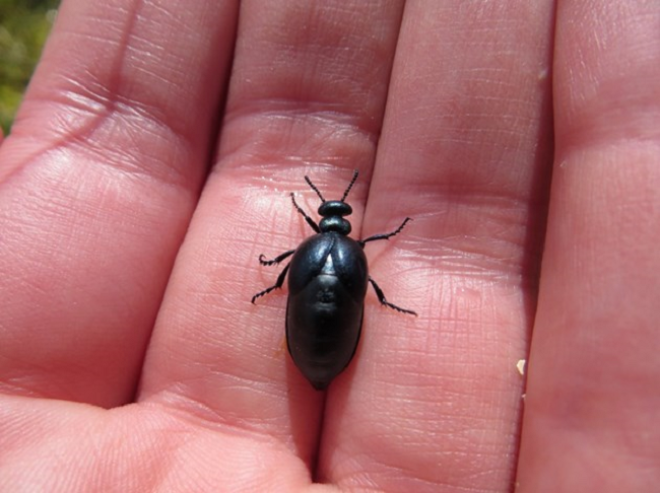Rare beetle found at Species on the Edge launch event in the Outer Hebrides

New multi-species conservation programme, Species on the Edge, kicked off public events in the Outer Hebrides with a short-necked oil beetle workshop on North Uist which saw 24 of the incredibly rare species found during the event.
After hearing about the success of the event on social media, enthusiasts on Tiree went searching for the beetle and were also successful, marking the first time short-necked oil beetles have been found on Tiree.
Species on the Edge is a new bold and ambitious partnership programme of eight conservation organisations, all dedicated to improving the fortunes of 37 priority species found along Scotland's coast and islands. Programme activity is spread over seven project areas: the Inner Hebrides and Argyll; Solway; the East Coast; the North Coast; Orkney; Shetland; and the Outer Hebrides.
Species on the Edge activity kicked off in the Outer Hebrides on Tuesday 25 April 2023 with their Outer Hebrides Launch Event. Attendees learnt more about the programme as well as one of the 37 target species, the short-necked oil beetle, at the North Uist Agricultural Centre, before heading out to the Balranald township to look for the rare invertebrates. It was a successful trip, with 24 beetles found by event hosts and participants.
Sally Morris, Buglife Conservation Officer, said “In 2020, the only known populations of short-necked oil beetles in Scotland were found on the Isle of Coll. Thanks to increased awareness through Species on the Edge, more populations have been found around Scotland. Short-necked oil beetles are rare in Great Britain and vulnerable to extinction due to their small, scattered populations. Presence of short-necked oil beetles are a great indicator of a healthy biodiverse ecosystem, as their lifecycle is linked to the northern colletes mining bee, a species that relies on flower-rich coastal grassland. Over the next four years, we will be talking to landowners about how they can manage their land to provide the right conditions for the short-necked oil beetle, and other invertebrate species.”
Fiona Strachan, NatureScot’s Species on the Edge Programme Manager said “It was great to be able to join the Outer Hebrides Species on the Edge team and take part in the first event of this exciting new programme. Finding short-necked oil beetles at a new site was fantastic and highlighted how much there still is to learn and discover about species living on our coasts and islands.”
The event also marked the launch of Buglife’s citizen science project, the Scottish Oil Beetle Search. Find out more about the Scottish Oil Beetle Search here: https://www.buglife.org.uk/scottish-oil-beetle-search/
Katy Malone (Bumblebee Conservation Trust), Outer Hebrides Area Manager for the Species on the Edge Programme, was excited about finding the rare beetle and the launch of public events in the Outer Hebrides: “This workshop marks the start of a four-year programme in the Outer Hebrides, and for me, it could not have gone any better. This is the first event of many that we have planned over the next four years. Residents and visitors should particularly watch out for the Outer Hebrides Wildlife Festival, which is being co-ordinated by the Bumblebee Conservation Trust over the next four years as part of the wider Species on the Edge programme.”
The Outer Hebrides Wildlife Festival will be taking place from Saturday 24 June to Saturday 01 July 2023 and is an opportunity for attendees to get closer to nature through guided walks, boat trips, outdoor activities, exhibitions and more. There is still time to contribute to the festival, whether by hosting an event, helping at events, or helping organise the festival. For more information and to get involved, email mairi.carrey@bumblebeeconservation.org.
The Species on the Edge partnership consists of Amphibian and Reptile Conservation, The Bat Conservation Trust, Buglife, the Bumblebee Conservation Trust, Butterfly Conservation, NatureScot, Plantlife and RSPB Scotland. Together the eight organisations will be delivering a four-and-a-half-year programme of work to tackle the impacts of environmental change on wildlife, to benefit both nature & people. The programme has a cost of over £6.5 million, with £4m of funding from the National Lottery Heritage Fund.
The target species on the Outer Hebrides include: great yellow bumblebee; dunlin; northern colletes mining bee; short-necked oil beetle; common pipistrelle bat; Arctic tern; lapwing; Irish lady’s tresses orchid.
Local communities are a key part of the Species on the Edge programme. Over the four and a half years, project officers based in each of the seven project areas will be working closely with those who live there to help them protect their local biodiversity. The programme will be offering opportunities to gain new skills and knowledge through workshops, training and volunteering. There will also be internships and mentoring opportunities.
Find out more about Species on the Edge on their website: https://www.nature.scot/scotlands-biodiversity/species-edge-sote/species-edge-about-project


